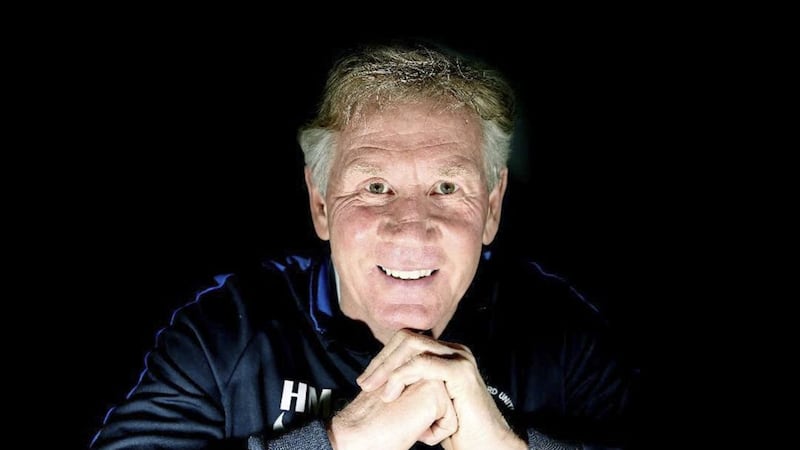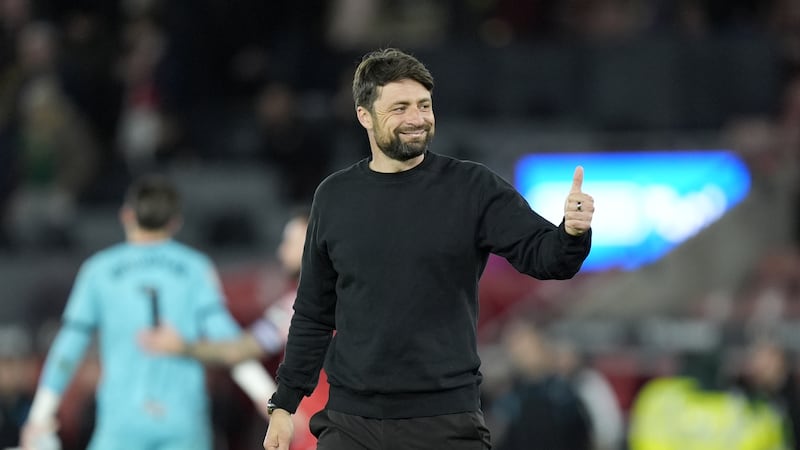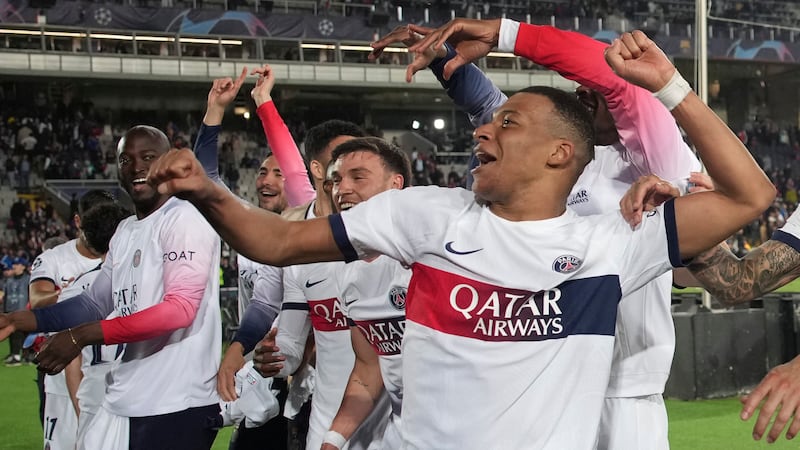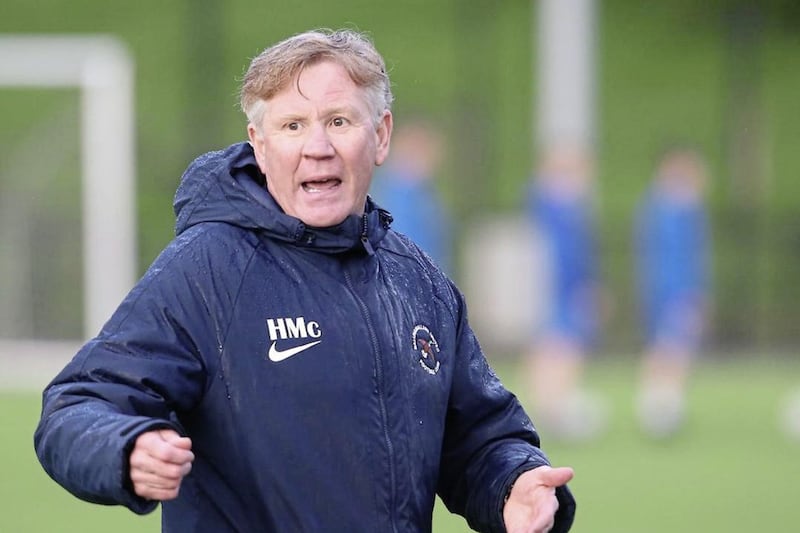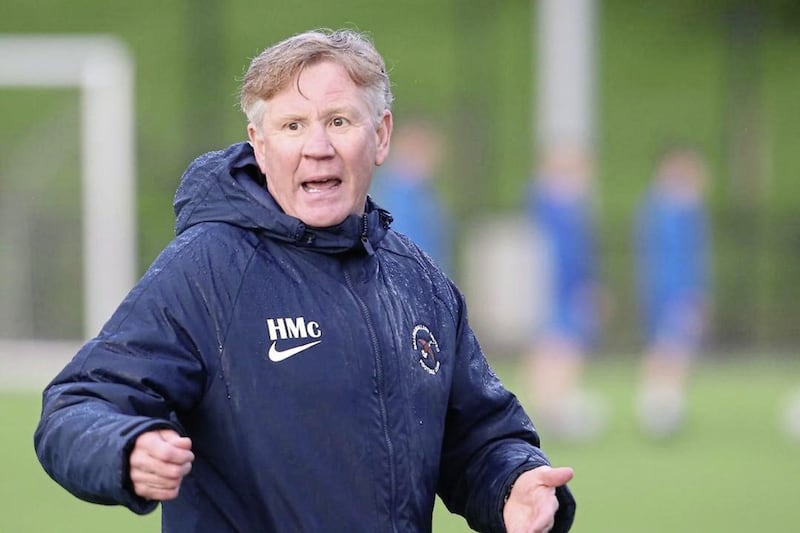After a life-time in football that has taken him to every nook and cranny of the local game, Northern Ireland's Junior international manager Harry McConkey will lead Ballinamallard United into Saturday's Irish Cup final against heavy favourites Crusaders. Here, he tells Brendan Crossan about his time working with special needs children and how empathy has been the bedrock of his life philosophy and managerial approach...
“The roots of morality lie in empathy”
HARRY McConkey doesn’t want it to be the Harry McConkey show. Don’t assume this to be false modesty.
He genuinely feels awkward that the media are ringing him rather than Steve Feeney or Craig Lynch or any other backroom team member.
In fact, if Harry had his way he would have you interviewing the tea ladies at Ferney Park who look after the Ballinamallard United players like they would their own sons.
But, no matter how many times Harry tries to wriggle off your hook, he fails.
There’s a simple reason for this: Ballinamallard United wouldn’t be making their first-ever Irish Cup final appearance against Crusaders this Saturday without the gargantuan contribution from the much-travelled Fermanagh native.
“He’s a man who thoroughly deserves it because of his work ethic but also because he has great humility,” says his former Larne team-mate and friend David Jeffrey.
“This is the culmination of many years of hard work. I’d say this is the absolute highlight for him – win, lose or draw. This will be the highlight...”
“If you quit you’ll never know what you’ll miss” – Harry McConkey
IN March 2018, Ballinamallard United were a lost cause. ‘Whitey’ Anderson managed to keep the Fermanagh club in senior football for six years.
A fresh voice was needed so ‘Whitey’ handed the reins over to seasoned coach Gavin Dykes.
In life, some appointments simply don’t work out.
Last season, the ‘Mallards couldn’t find any rhythm and rather than hang around, Dykes decided to make way for the good of the club.
‘Somebody call Harry.’
McConkey was chipping away with Northern Ireland’s Junior International and Regions’ Cup teams – posts he's held with distinction for close to 15 years.
He’d managed Ballinamallard United in the early-to-mid-noughties and always had a soft spot for the club.
They were his club.
In 2002, he managed to prise Fermanagh GAA ace Shane McCabe away from Finn Harps and alongside the likes of Bob Carroll, (Roy Carroll’s brother), Richard Cathcart, Gareth Liggett, Gary Bownes (RIP), Colm Monahan, Shane O’Brien and Matthew Holden, they won the old B Division crown and reached the Intermediate Cup final.
“It was all local lads back then – Catholics and Protestants – and we were all one,” says McCabe, who would go on to carve out a hugely successful career in the Irish League.
“I remember we trained at Necarne - it was an equine centre where the horses would have run about - and we’d shovel horseshit off the surface every night just to train. This was the type of place we had.
“I would have played with Harry in his later years. At that time he was playing left back or centre back; he would have been 41 or 42, hobbling about as player/manager. He was still decent at that time. His enthusiasm would have rubbed off on everybody.
“His attention to detail was frightening, absolutely frightening,” McCabe adds.
“We were playing in the B Division and he would have had a flip chart, six or seven pages every game. Every single thing was covered.
“He would have your role highlighted; he would have the opposition highlighted. He would tell you about the guy who was marking you: ‘Listen, he tends to turn in on his left foot… ‘He’s a tendency to foul, he’s a bit irrational’… ‘He’s good in the air but if you take him on the outside, he doesn’t like it...’
McCabe played only a short time for McConkey before some of the bigger Irish League clubs came calling for the midfielder’s services – but the bond they shared in 2002/03 holds to this day.
“After my father, if I needed any advice, I’d ask Harry,” he says.
McConkey left Ferney Park in 2006 and was later approached by Joe McAree, his old friend, to give a helping hand with Dungannon Swifts reserves.
As well as finding his feet with Northern Ireland’s Junior International squad, McConkey became part of McAree’s backroom team that guided the Tyrone club to the 2007 Irish Cup final, where they lost on penalties to Linfield.
Harry’s son Mark was part of the Swifts team that day.
He enjoyed a successful managerial stint with Dergview, while still teaching at Willowbridge (‘The Erne’) School for children with special needs in Enniskillen and flying around Europe with the international team.
By the time Ballinamallard hit the hard shoulder towards the end of last season, appointing Harry McConkey was a no-brainer.
He'd recently retired from teaching after 35 years and had since set up a Coach Mentoring company.
“I remember Alfie Wylie said: ‘That’s a great appointment by Ballinamallard, because Harry’s a great football man,’ McConkey recalls.
“The first night I went out to take the team, I said to the players that I didn’t want to be known as a good football man, I want to be known as a good human being and my work with you is to treat you in the best way that I can and in a way that you deserve, and let’s just start with that.”
“We wore white t-shirts, red shorts and blue and white socks – red, white and blue – and most of our team was Catholic. The only reason we wore those colours was because it was the only colours Brady’s shop, in Clones, had. It didn’t matter what colour or creed you were” – Harry McConkey
IT was preordained Harry McConkey would manage football teams forever and a day.
He was born in a small Fermanagh village called Magheraveely that backed on to the old market town of Clones.
McConkey was just nine-years-old when he formed Magheraveely United.
He organised games with teams in the nearby villages of Clones and Newtownbutler.
“My next door neighbour was Mrs McAviney and she stitched numbers onto our jerseys for me, cut them out of felt and put them on the jerseys.
“We had the number nine for Bobby Charlton, number seven for George Best and we’d fight over who was going to wear it. I remember buying 15 plastic balls. We ran garage sales and we'd ride into Clones to try and buy t-shirts.
“Barry McGuigan [former boxing world champion] and his brothers lived in Clones and we’d borrow them for games. I used to ride into Clones on my bike and get Barry, put him on the bar of my bike and we’d head off to play Newtownbutler.”
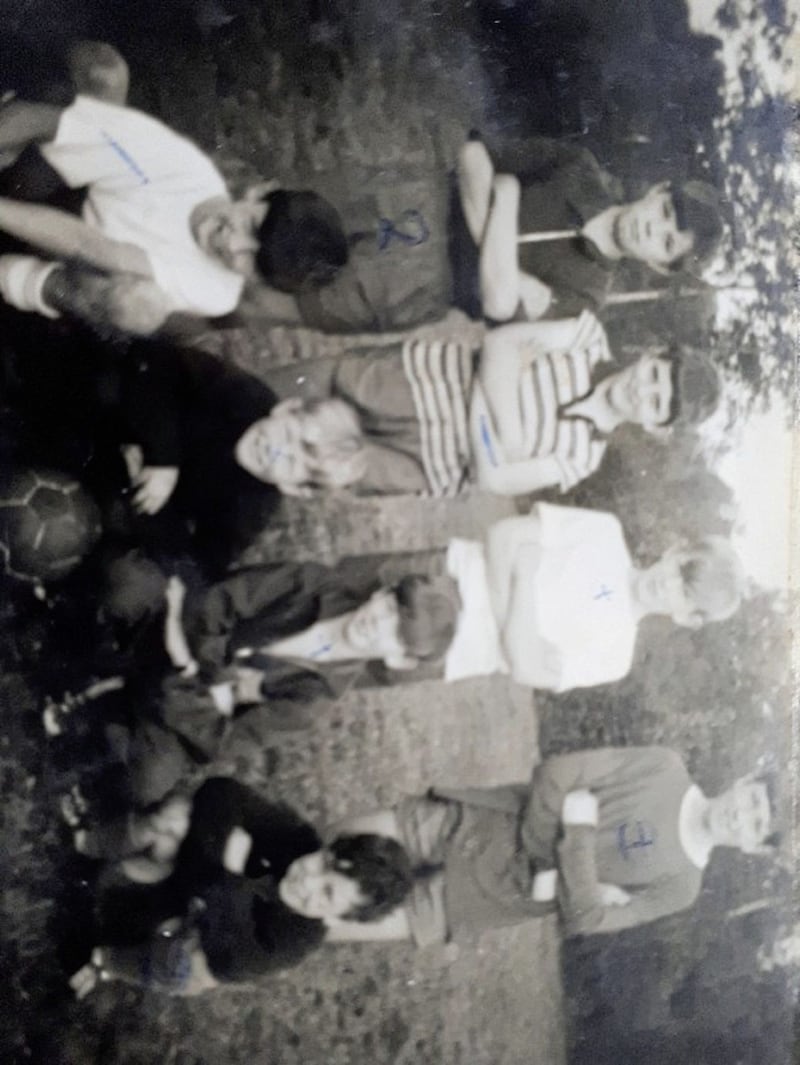
“What strikes you about Harry is his human qualities and it relates to his work with the special needs kids; he always talks about having empathy with his players.” – Denzil McDaniel, McConkey’s assistant manager at Ballinamallard United (2002-06)
McCONKEY had been on the road long enough. A PE teacher, he worked in Ballee High School, Ballymena, Downshire School in Carrickfergus and Carrick College all of which spanned two decades.
He took a career break in 1998 to 2001 and became involved in management training at the Lusty Beg Resort where commercial companies would bring their employees for team-building exercises.
He was by no means finished with teaching, though, and when a job came up in 2002 closer to home, working with children with special needs in Willowbridge (‘The Erne’) school as PE co-ordinator, he rolled the dice.
“I wondered did I have the qualities in me to take the challenge on.”
For the guts of 14 years until he retired in September 2016, McConkey put his heart and soul into the children, aged between four and 19, at ‘The Erne’.
“I always felt for the underdog,” he says matter-of-factly.
“In mainstream education there are lots of kids who are great at sport but struggle academically. You’d hear different things about the kids: ‘Oh, he’s a bad wee pup.’
“And yet, you knew there was a wonderful side to that child and you saw it through sport, you know? When you could connect with a child you could see them develop.”
One pupil at ‘The Erne’ – we’ll call him Johnny – used to curl up in a ball when he was in school and scream.
Bit by bit, McConkey managed to bring Johnny out of his shell.
Some days it felt like taking two steps forward and three steps back.
He eventually got Johnny involved in the school’s soccer team.
Johnny - a Manchester United fanatic - always wanted to stay in goals because he felt safe there.
“I used to call him Van der Sar - just to get him out and moving around,” McConkey says.
After a while Johnny felt safe enough to play outfield, defence to start off with, before he was eventually moved to centre forward where he scored a bucket-load of goals.
Johnny went on to play for Northern Ireland’s disability team where he thrived.
“The roots of morality lie in empathy,” McConkey insists.
“Remember the fear you had when you sat for mock exams? Multiply that by 100 for these children when you’re asking them to do Maths and English which is really difficult for them.”
The children in ‘The Erne’ loved the field trips best of all. In truth, so did Harry.
There was a wonderful sense of freedom and joy among the kids when they piled onto the bus and had the music blasting.
Together they went on skiing trips and attended football matches across the water.
“As part of our RE [Religious Education] lessons I would ring up local ministers and priests and set things up as part of a wee project - Places of Worship in our community.
“The first thing we’d look at was the architecture of the outside of the building. So I’d line up the ministers or the priests and we had laminated questions for them.
“The first question for the minister or priest would be: ‘Is the money good?’
“And the minister would say: ‘I actually don’t get paid.’
“‘Are you married?’
“’No, I’m not able to get married,’ the priest would say.
“What? You can’t get married?’ the kids would say back…”
McConkey would be busy taking photographs and the following week he’d set up a power-point presentation, have a quiz based on their recent field trip to determine what the kids were able to retain.
Through their teacher’s patience, ceaseless energy and imagination, school came alive to them.
When the quiz was over, Harry would tell the kids: ‘Now, don’t let anybody tell you that you can’t remember anything.’
Reflecting on those most rewarding of days in ‘The Erne’, Harry adds: “It’s a bit like football management: sometimes you don’t realise what it has taken out of you.”
Denzil McDaniel, editor of The Impartial Reporter newspaper for 27 years, struck up an enduring friendship with McConkey when the pair got together to organise a charity match in memory of former Ballinamallard United manager Greg Turley who was tragically killed in a road accident on the way to training in September 1999.
McConkey, who was a close friend of Turley’s, was persuaded to take the reins at the club following his death and McDaniel became his right-hand man for the next four years.
“I managed the Fermanagh Milk Cup squad for a few years and I brought the team down to Harry’s school where the lads spent a day with the special needs kids,” McDaniel explains.
“It was inspirational. The way they responded to Harry was fantastic, it really was.
“I saw Harry in action with the kids many times and he was unbelievable - the energy that he put into it. It certainly wasn’t a day job to him.”
In his previous teaching jobs in Ballymena and Carrick, he got to know the children for four, five, maybe six years. But at ‘The Erne’ it was different.
It was hard to untangle all the emotions the teachers had invested in the kids at the school.
“When you’ve a child for maybe 15 years they’re like your own child,” McConkey says, now living in Enniskillen.
“I remember this nurse saying to me: ‘Be very, very grateful for every day that you have’. Maybe that is part of my drive” Harry McConkey
AFTER his Magheraveely United days ended, he moved on to play for Lisnaskea Youth Club in his teenage years. But a horrific motorcycle accident in 1974 left him with six crushed vertebrae and bad facial injuries.
Three millimetres north and he would have been paralysed from the neck down.
Staring out of his hospital bed, the-then 14-year-old was told he would never play physical sport again.
Seven months later, he was starring in the YMCA UK five-a-side Championships in Nottingham.
McConkey’s football journey would send Wikipedia in a tailspin.
It took him to Glenavon, Dungannon Swifts, Chimney Corner, Carrick Rangers, Ballyclare, Ballymena and Coleraine, where he was part of the Bannsiders’ ’86 team that clinched the Ulster Cup and played in Europe the following season.
It was during his spell at Larne injury struck again.
An innocuous challenge with Ballymena’s Mark Carlisle resulted in McConkey shattering his arm in 22 places.
In hospital, Larne team-mate and player/manager David Jeffrey visited him every night.
He battled back to full fitness and enjoyed a spell with Ballymoney United where a young Oran Kearney was cutting his teeth.
But all roads seemed to lead back to his native Fermanagh. And after leaving Ferney Park in 2006, he was back at his spiritual home 12 years later.
“Brian [McLaughlin] and me always used to wax lyrical about when Harry was going to come and work with us. What negated that is where Harry lives. He’s up in Fermanagh. We would always say: ‘There’s a job that Harry could have done.’ He was diligent and totally thorough” – David Jeffrey
UPON his return to Ballinamallard United in March 2018, the chances of rescuing the club from relegation were remote as they were adrift at the bottom of the Irish Premiership.
And yet, McConkey almost pulled off the impossible.
Miraculously, they still had a chance of preserving their top-flight status on the final day of the season but were cruelly relegated on goal difference despite beating Glentoran.
With Championship football beckoning, McConkey thought long and hard about committing for another season, particularly with a second ankle replacement operation pending.
“In May, I had two names on a sheet and very little money in the bank and I thought: ‘Now, the romance is over.’ I drove from Cavan to Donegal to Belfast trying to ask players would they consider staying on. It was really, really tough because a lot of them had better offers… I was so delighted to be able to persuade players like Richard Clarke, Matty Smyth and Ryan O’Reilly to give us a chance.”
He gave youth its head and there were periods of turbulence in the lower division this season but the ‘Mallards steadied themselves and managed a top six finish.
But it has been their remarkable, history-making run to Saturday’s Irish Cup final – overcoming senior clubs Dungannon Swifts and Warrenpoint Town on penalties – that has everybody talking about the job Harry McConkey has done and Ballinamallard’s renaissance.
The roots of morality lie in empathy.
McConkey is a master of building teams out of nothing.
Each player – from veteran goalkeeper John Connolly to Richard Clarke to young Darragh McBrien – would run through brick walls for their manager.
“In this day and age,” he says, “when families don’t get around a table enough we are able to do that twice a week as a group.
“That value of sitting around and talking to each other and the ladies who come in and feed them are like their mammies. There is that great sense of family here.”
Last weekend, the Ballinamallard players walked around Windsor Park to try and visualise what Saturday afternoon at half-two might look and feel like.
When Harry McConkey looks in the mirror on Saturday morning and straightens his cup final tie, he’ll know that the work is done. With Harry, the work is always done.
He’ll not say it - but Saturday is a life’s reward for his tireless endeavours and what he has given to others.
“To me, it’s a fitting reward,” McDaniel says of his friend.
“The line about nice guys not being successful – Harry disproves that because of everything that he’s done in football, and everything that he’s done for this area. To see him walking out on Saturday will be a proud moment for a lot of people.”
